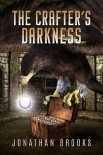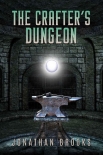The Crafter's Darkness: A Dungeon Core Novel (Dungeon Crafting Book 4) Jonathan Brooks (best smutty novels TXT) 📖

- Author: Jonathan Brooks
Book online «The Crafter's Darkness: A Dungeon Core Novel (Dungeon Crafting Book 4) Jonathan Brooks (best smutty novels TXT) 📖». Author Jonathan Brooks
The first thing that her container being used for the brewing process – which was a closed, cylindrical, round-bottomed, copper vessel 5 feet tall and 10 feet wide with access ports near the top to view the process inside and to add materials – needed was to add water to the malt when it was poured inside. This was easy enough to add with a Water-based trap that was adjustable and able to be regulated by simple activation triggers along the outside of the vessel that just needed to be touched and it would add the designated amount. There were 10 different amounts of pure water that could be added, from just a bucketful to an amount that would fill up half of the container, so it would be easy enough to add a little more if it were needed.
When the water and malt mixture was inside, then came heat which had to be regulated closely to produce something called wort. The wort was a liquid that would emerge from the malt mixture upon heat being applied, and required a few hours to fully extract all of the special liquid, with a large portion of the water boiling away as steam, leaving (for the most part) just the leftover grain and the wort.
The heating process was a difficult proposition because it also needed to be used in other stages of brewing, as well as cooling. In a later stage, in fact, a certain temperature needed to be maintained for weeks, which was extremely difficult to achieve with a Fire-based trap using Mana. Therefore, she went the enchanting route using a similar enchantment rune as what she had used to protect the riders on the back of her Aerie Rocs: Felbar’s warmth enchantment.
In truth, it was two enchantments that did the trick, though they were very similar. Each was inscribed by her Unstable Shapeshifters over the entire vessel, though they did separate things; one warmed up everything within the container, while the other cooled it down with an additional Invert rune added to the sequence. It took quite a lot to enchant the entire container, which was why she needed so many Shapeshifters – though that wasn’t the hardest part. The hardest part was that she did each of them 3 times with separate activation areas, and then designing the accompanying Fire and Spirit Energy Orbs that would supply the energy to the enchantments.
The basic principle behind them was that the brewer – in this case Teving – could place paired Energy Orbs of six different Limiter rune settings on one of the three activation spaces that were clearly marked out on a low shelf attached to the bottom of the vessel. If Teving placed the strongest paired energy source on one of the activation spaces and it wasn’t quite hot enough inside, then he could place another pair of Orbs with the lowest power output on a second activation space, bumping up the temperature a little more. Conversely, with the inverted warmth enchantment, he could cool it off just a little bit if he placed one of the paired Orbs on the spots designated for those enchantments.
This way, he could adjust the temperature to hundreds of different levels, depending on which paired Energy Orb he placed first and adjusted it with either more heat or cooling. To further aid in that, she created a second set of Orbs – that were just copies of the original six – so that they could be used to adjust the temperature with even finer control. Sandra thought it was adequate for what needed to be done, but both Teving and Glencha were ecstatic.
“This is genius! With the ability to make so many adjustments to the temperature, I should finally be able to perfect my recipe!” Teving was overjoyed at the prospect, and Sandra was happy that he seemed happy. Glencha was excited as well, though apparently distilling wasn’t quite as temperamental as brewing was; regardless, she seemed more than pleased.
Once the wort was extracted from the malt mixture, the most complicated part of the brewing process was next: removing the solid remains of the two grains from the liquid wort. Fortunately, Sandra had powerful Mana on her side, which was applied through the use of an Air trap. At the bottom of the large container from the inside, she had a trap made entirely of hardened air that was basically like a fine mesh of individual air strands woven together like cloth; during the initial process of removing the wort from the malt, an external trap activation could bring the mesh up and down a few inches fairly rapidly, which helped to move everything inside the container around so that it was mixed up and circulated.
A separate trap activation at this stage could be started, however, that would slowly bring the air mesh upwards, pushing the malt mash together up against the top of the container. This resulted in acting as a type of strainer that would squeeze out the liquid, and it could be repeated multiple times to ensure most if not all of the liquid was being forced out and through the Air-based trap. Sandra also made sure to reinforce the top and upper walls of the container, because the force of the trap could be quite impressive.
Once the liquid was extracted, removing the waste malt mixture (which was no longer needed for the brewing process) was as easy





Comments (0)